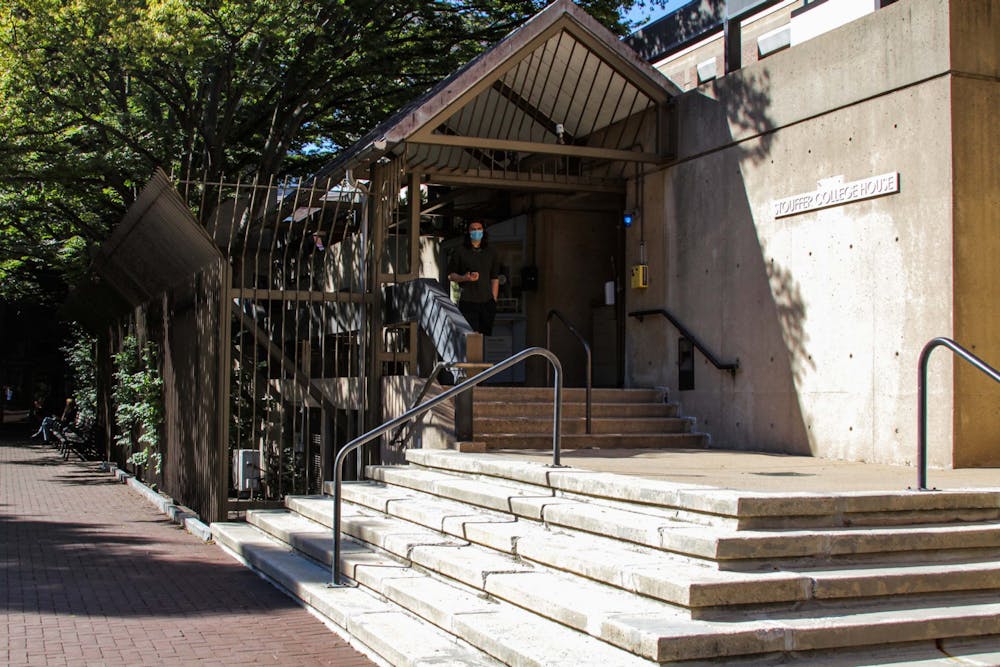
Penn will now require students with COVID-19 living on campus to isolate in place as designated University isolation housing approaches capacity.
In a Wednesday afternoon email to the Penn community, Chief Wellness Officer Benoit Dubé wrote that the arrangement is being conducted “under the supervision of” the University’s public security team. The announcement came hours after the University announced a return of indoor masking starting April 18.
Executive Director for Public Health and Wellbeing Ashlee Halbritter told The Daily Pennsylvanian that Penn is preparing an isolation housing portfolio expansion by using additional University-owned properties and apartments.
She added that the University is also currently utilizing rooms at The Mason on Chestnut Apartments and Axis Apartments as isolation spaces, and will continue to do so through the end of the academic year.
“The challenge now is simply that the case numbers are so high that even as we continue to find isolation space, it’s never going to be enough,” Halbritter said. “At least until we hit our peak and start on the downward trend.”
Chief Operating Officer for Wellness Services Erika Gross said that although Penn owns the Sheraton University City Hotel, the facility will not be converted into isolation housing to honor current visitors’ existing room reservations.
“There’s still a lot of people coming to campus, and the Sheraton is being used as a hotel,” Gross said, adding that when the Sheraton was being used as an isolation space for students earlier in the spring semester, there were no outside visitors.
Halbritter said the uptick in positive cases came from socialization during events held over Spring Fling. The environment of “continued partying and gathering” has exacerbated the COVID-19 case counts.
Students in college housing who have a roommate that tests positive for COVID-19 will have to isolate in place depending on their vaccination status.
If the student doesn't test positive and is up-to-date with COVID-19 vaccinations — which the University describes as being both fully vaccinated and boosted — they will not have to isolate and may continue living in the shared living space, while also attending classes and participating in University activities.
If the student is not up-to-date with COVID-19 vaccinations, the student must quarantine in place in accordance with Penn’s public health guidance.
All eligible students must upload their booster information into their Student Health Portal if they have not done so already.
All students are encouraged by the University to utilize PennOpen Pass to not only report symptoms but to report themselves as a close contact or roommate of a positive case. Gross said that PennOpen Pass provides “expedited access” to information and guidance when questions come up concerning isolation and quarantine protocols.
Gross said that when it comes to these questions, the information and easy access to people that can help may be found by utilizing of PennOpen Pass.
Vulnerable student populations on campus who might require additional assistance are being provided with extra help by the Wellness team, should they test positive for COVID-19.
“We’ve worked really closely with Weingarten Student Disability Services to support any student along the way that has had any sort of need throughout all of COVID-19,” Gross said. “We’ll continue to follow those same guidelines as we move forward.”
Halbritter said that Public Health and Wellbeing continues to work closely with the Office of Environmental Health and Radiation Safety, in addition to Penn’s Maintenance and Housekeeping Department to ensure the cleanliness of College House facilities.
Bathrooms are cleaned twice each day, Halbritter said, which is “above and beyond the CDC recommendation but continues to be Penn’s request.” For students in suites who share bathrooms, Halbritter said it boils down to personal behaviors.
“It is a great idea to wipe down the kitchen or the bathroom before and after you use it,” Halbritter said. “People have to take ownership, and roommates should talk to each other and have a plan or communicate expectations.”
In terms of academics, Halbritter said that it is Public Health and Wellbeing’s goal to keep students in classes.
“We know that April is a really fun time on college campuses, and there is a lot of fun stuff that happens,” Halbritter said. “We want people to finish out the year, finish out their academic coursework, and be able to go home when they’re ready to go home.”
The Daily Pennsylvanian is an independent, student-run newspaper. Please consider making a donation to support the coverage that shapes the University. Your generosity ensures a future of strong journalism at Penn.
Donate






